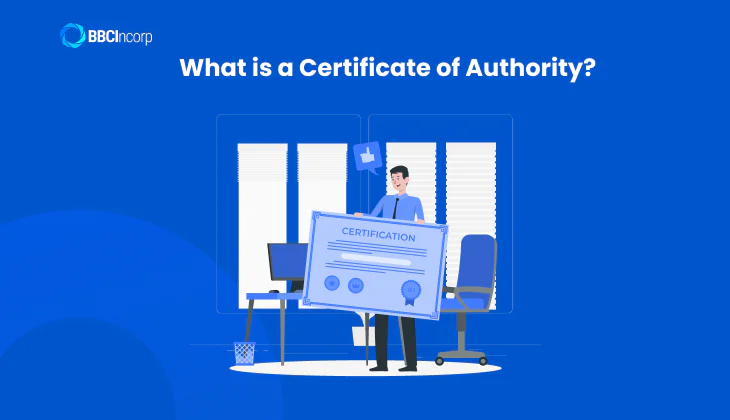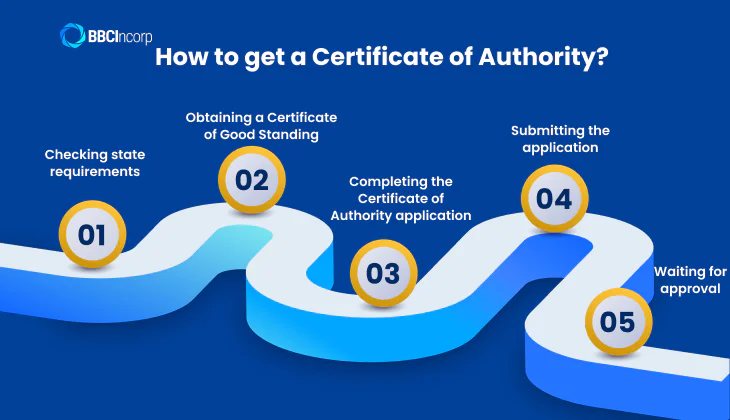
Table of Contents
When expanding your business operations across state lines, ensuring compliance with local laws is critical. A Certificate of Authority is one of the key documents you’ll need to legally operate in a state outside your home jurisdiction. Without it, your business risks penalties, fines, and potential legal disputes.
But what is a Certificate of Authority? This guide will break down what a Certificate of Authority is, why your business might need one, and how to apply for it step by step. Whether you’re a seasoned entrepreneur or starting your first venture, understanding this vital document is essential for smooth interstate operations.
What is a Certificate of Authority?
A Certificate of Authority (CoA), also known as foreign qualification or Application for Authority, is an official document that grants your business the right to legally operate in a state other than your home state.
In other words, the certificate of authority meaning lies in its role as a “permission slip” issued by a state government, ensuring your business complies with local regulations when expanding operations.
For example, if an LLC or corporation formed in Delaware wants to do business in California, it must obtain a Certificate of Authority from California to legally operate there.

What does it mean to operate in another state?
Operating in another state involves activities that demonstrate a significant business presence in that state. Examples include:
- Hiring employees in the state
- Owning or leasing property there
- Engaging in significant sales or contracts within the state
- Soliciting business or offering services to local customers
However, passive activities like maintaining a bank account or holding occasional meetings may not qualify as operating in another state.
Who issues a Certificate of Authority?
While the exact issuing body may vary, most Certificates of Authority are granted by the Secretary of State’s office in the state where your business intends to operate. Some states may require additional documents from their Department of Revenue or similar agencies to complete the process.
What is the purpose of a Certificate of Authority?
Who needs a Certificate of Authority?
A Certificate of Authority is typically required for businesses that operate in a state other than the one where they were formed. If your company plans to conduct business, hire employees, or open physical locations in a different state, you’ll need this certificate to register as a “foreign” business entity in that state.
Typical examples include retail chains opening branches in new states, freelance professionals with contracts across state lines, or e-commerce companies warehousing inventory in different locations.
Why is a CoA essential?
Obtaining a Certificate of Authority is crucial for staying compliant with state regulations. It ensures your business can:
- Legally conduct transactions and fulfill contracts outside your home state
- Operate without risking penalties or fines for failing to comply with foreign state laws
- Establish a strong legal presence, increasing trust with customers and local authorities
Penalties for not obtaining a Certificate of Authority
Failing to obtain a Certificate of Authority can come with steep consequences, including:
- Fines and penalties
- Back taxes, along with accrued interest and fees
- Denial of legal rights, such as the ability to file lawsuits in the state
For instance, if a business operating illegally in another state tries to enforce a contract dispute, courts may refuse to hear the case due to noncompliance with CoA requirements.
Distinction between a Certificate of Authority and other permits
Is a Certificate of Authority a business license?
No, a Certificate of Authority is not the same as a business license. While both are important for legal compliance, they serve different purposes.
A Certificate of Authority allows a business to operate in a state other than the one where it was originally formed. It is essentially a registration for businesses expanding across state lines, ensuring they meet the regulations of the new state.
On the other hand, a business license is typically a permit that allows a company to legally operate within a specific city, county, or state. Depending on the business activity you conduct and industry, you need to obtain various types of business licenses.
Certificate of Authority vs. Sales Tax Permits
A Sales Tax Permit (sometimes called a reseller’s or seller’s permit) is necessary for businesses that sell taxable goods or services. It allows you to collect sales tax from customers and remit it to the state. This permit is issued by the state’s tax authority and is required if your business has a taxable presence (nexus) in the state.
To summarize:
- Certificate of Authority is about registering your business to legally operate in another state.
- Sales Tax Permit is about complying with state sales tax laws when selling goods or services.
What does a certificate of authority look like?
The layout and details of a Certificate of Authority may differ slightly depending on the state’s requirements, but it typically contains the following key details:
- Business name: The official name of the business as registered in its state of incorporation.
- Registered agent information: The name and address of the business’s registered agent in the new state.
- Certificate of Authority number: A unique identifier assigned to your business.
- Date of approval and State seal: The approval date, along with the official state seal and the signature of the issuing authority (often the Secretary of State).
This document confirms your business’s legal ability to operate in a specific state. It is often printed on official letterhead or provided as a certified PDF if issued electronically. Some states may include additional features, such as document identification numbers or unique state-specific formatting.
Legal requirements for obtaining a Certificate of Authority
To apply for a Certificate of Authority, most states will require the following documents and steps:
Business registration in the home state: Ensure your business is properly registered and in compliance with all regulations in the state where it was originally formed.
Application form (commonly called Application for Authority): Complete the specific form required by the state you are expanding into. This form typically asks for details about your business, such as its name, address, and type of entity.
Certificate of Good Standing: Obtain this document from your home state to verify that your business complies with all regulations, has paid any necessary fees, and is in good standing legally and financially.
Registered agent based in the state where you’re applying: You will need to designate a registered agent in the new state to receive official documents on behalf of your business, such as legal notices or tax forms.
These steps help ensure that your business meets all legal requirements to operate in multiple states.
How to get a Certificate of Authority?

Step 1: Checking state requirements
Start by researching the requirements for the state where you plan to operate. While the process is generally similar, each state may have specific rules or additional forms to complete.
Appoint a registered agent
You’ll need to appoint a registered agent in the state you’re expanding to. The registered agent must have a physical address in that state, be available during regular business hours, and meet the state’s legal requirements for registered agents.
Verify your business name’s availability
Make sure your business name is unique in the state you’re entering. If your name is already in use or too similar to an existing business, you may need to register a fictitious name, also known as a “doing business as” (DBA) name. This step ensures compliance with state regulations and avoids potential conflicts.
Step 2: Obtaining a Certificate of Good Standing
To get a Certificate of Authority, many states require a current Certificate of Good Standing. This document verifies that your business is compliant with state regulations, such as holding a valid business license, completing annual filings, and staying up to date on state taxes.
The process to obtain this certificate is usually simple. In most states, you can request it online, while some may require a paper application. If your business isn’t in good standing, you’ll need to address any outstanding issues before you can qualify for the certificate.
Step 3: Completing the Certificate of Authority application
To apply for a Certificate of Authority, visit the Secretary of State’s website (or the equivalent business authority) in the state where you plan to register. Download the application form and complete it carefully.
You will need to provide the following information:
- The legal name of your business
- The state and date your business was formed
- Your business structure (e.g., LLC, corporation)
- Details about your registered agent
- A description of your business activities
Step 4: Submitting the application
Submit your completed form, along with the required documents and fees, to the appropriate government authority. Most states offer several filing methods, including online submission, mail, or in-person delivery.
Here’s what you’ll need to submit:
- A certified copy of your Articles of Organization or the Articles of Incorporation.
- Proof of authorization for the individual signing the application.
- Filing fees (these vary by state, typically ranging from $50 to $300).
Many states make it easy to file online, but you can also choose mail or, in some cases, in-person submission.
Step 5: Waiting for approval
Processing times vary by state and submission method (e.g., online filings are usually faster). Check the timeline on your state’s website to plan accordingly.
Once approved, you’ll receive your Certificate of Authority as either a physical or electronic document. Keep it in a safe place, as you’ll need it for tasks like opening bank accounts, signing contracts, or handling other business activities.
Remember to file annual renewals or reports and pay any required taxes to stay compliant.
Register your new business in Delaware with BBCIncorp
If you’re considering incorporating your business in Delaware, BBCIncorp can help make the process smooth and hassle-free. We offer comprehensive incorporation services that include:
- Verification of business name availability
- Preparation and filing of all required documents with the Delaware Division of Corporations
- Appointing a registered agent in Delaware
- Assistance with obtaining a Certificate of Good Standing
- Ongoing compliance support to ensure your business stays in good standing with the state
Alongside our services in Delaware, we provide comprehensive incorporation solutions for businesses seeking to establish companies in renowned offshore jurisdictions. Our offerings include:
- Cayman Islands company registration
- Company registration in Cyprus
- British Virgin Islands company registration
- Company formation in Seychelles, St. Vincent and Panama
Let us help you navigate the process seamlessly, no matter where you choose to incorporate. Contact us today via service@bbcincorp.com to get started!
Conclusion
In conclusion, obtaining a Certificate of Authority is an important step in starting and maintaining a business. It allows you to legally conduct business activities within a specific state and provides credibility to potential customers, partners, and investors.
To avoid delays or penalties, familiarize yourself with the specific requirements and timeline for obtaining this document in your state. Additionally, keep your certificate secure and up-to-date by meeting annual renewal requirements and adhering to tax obligations. With proper preparation and understanding of what is a Certificate of Authority and how it works, you can streamline the process and focus on growing your business confidently.
Frequently Asked Questions
Is the Certificate of Authority the same as a tax ID?
A Certificate of Authority may have varying meanings depending on the state. In New York, it is issued by the New York Tax Department and includes your sales tax identification number. This certificate authorizes your business to collect sales tax and to issue or accept most sales tax exemption certificates within New York State.
When do I need a Certificate of Authority?
Whether you need a Certificate of Authority depends on how a state defines “conducting business” within its borders. Generally, if your business meets any of the following criteria, you may need to secure one:
- Setting up a physical presence in the state, such as an office, store, warehouse, or restaurant.
- Employing staff who work in the state.
- Frequently signing binding contracts within the state.
- Regularly holding in-person meetings with clients or customers in the state (virtual meetings or emails alone usually don’t qualify).
- Earning substantial and consistent income from business activities in the state.
This list is not comprehensive, as states have different legal definitions and court rulings on what counts as conducting business. To ensure compliance, it’s best to consult a legal professional to determine if your business needs to register for a Certificate of Authority in a particular state.
What are the consequences of operating a business without a Certificate of Authority?
Each state has its own penalties for running a business without proper authorization, and the consequences depend on the severity of the violation. Minor violations usually result in significant fines, while more serious compliance failures could lead to the state banning your business from operating there, even if you later obtain the necessary certificates.
To avoid these risks, it’s essential to carefully research and understand the compliance rules of any state before starting operations. Keep in mind that being compliant in your home state doesn’t guarantee compliance elsewhere, as regulations can vary widely between states.
Disclaimer: While BBCIncorp strives to make the information on this website as timely and accurate as possible, the information itself is for reference purposes only. You should not substitute the information provided in this article for competent legal advice. Feel free to contact BBCIncorp’s customer services for advice on your specific cases.
Industry News & Insights
Get helpful tips and info from our newsletter!
Stay in the know and be empowered with our strategic how-tos, resources, and guidelines.





